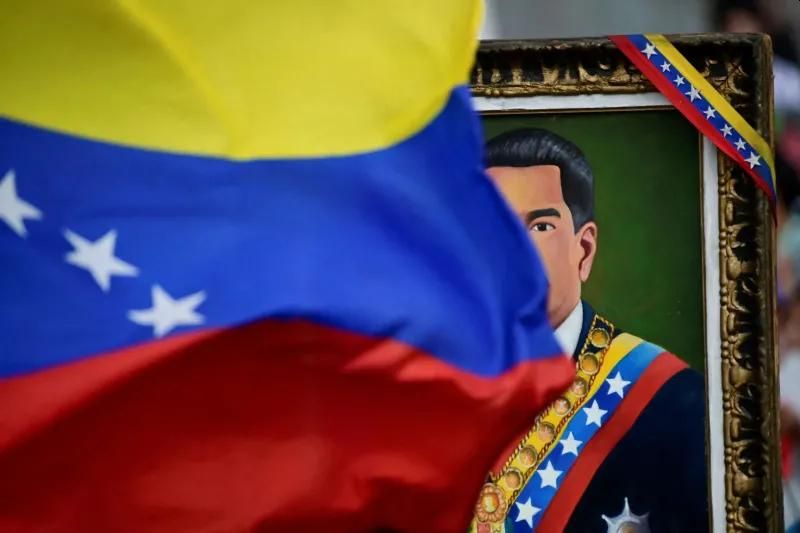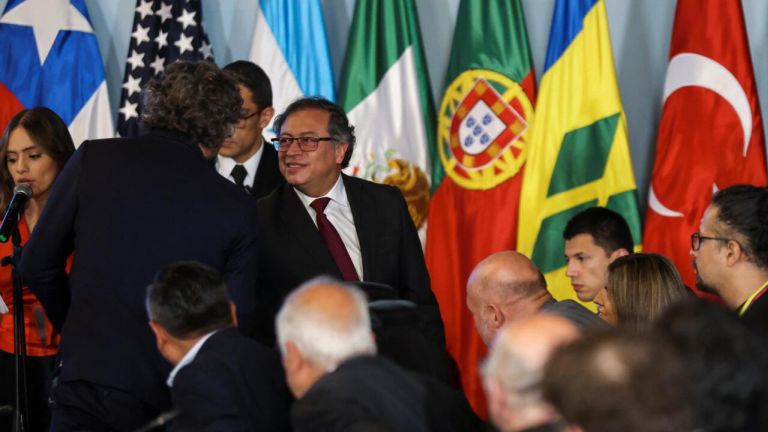By Eric Vandenbroeck and co-workers
Among the most
complex foreign policy challenges facing the new U.S. administration is the
situation in Venezuela. Over the past 12 years, Venezuela has transitioned from
a fragile democracy to an entrenched authoritarian regime, experiencing one of
the most severe economic collapses and migration crises in modern history
outside wartime. In recent years, these problems have increasingly affected the
United States. During the past five years, U.S. authorities have apprehended
more than 900,000 Venezuelans attempting to cross the southern border.
Many expect that
Donald Trump’s presidency will mean the return of the maximum-pressure approach
to Venezuela that defined his first term when Washington imposed sweeping oil
and financial sanctions, backed efforts at an armed uprising, and even floated the
possibility of direct military action. At a rally in Florida just three days
before the election, Senator Marco Rubio, Trump’s nominee for secretary of
state, asserted that under the new administration, “we will have a very
different position, much tougher and much clearer, not only in Venezuela but
also in Cuba and Nicaragua.” Rubio has cosponsored legislation to codify
sanctions on Venezuela, conditioning any sanctions relief and diplomatic
recognition on Venezuelan President Nicolás Maduro relinquishing power and an
opposition-led transition.
But a return to the
failed strategy of maximum pressure by the new administration would be a grave
mistake. Sanctions are rarely effective in achieving regime change, and
Venezuela is no exception. Far from destabilizing Maduro, U.S. sanctions have
helped him consolidate control, increasing the asymmetry of power between the
state’s apparatus and an impoverished and weakened civil society. More than
seven million Venezuelans have fled the country since 2014, and doubling down
on pressure could further worsen the living conditions of those remaining.
Maximum pressure will, therefore, cut against Washington’s effort to reduce
irregular migration and ensure a stable energy supply.
The United States
should continue to condemn Maduro’s authoritarian government for its human
rights violations and dismantling of democratic institutions. But Trump and his
administration should adopt a strategy of targeted engagement with Venezuela’s
authorities. Such a strategy would prioritize maintaining or strengthening
economic and diplomatic linkages between the United States and Venezuela—the
types of connections that can empower stakeholders committed to fostering a
democratic transition. The first priority of U.S.
policy should be to alleviate the suffering of Venezuelans, recognizing that
broad economic sanctions have exacerbated that suffering. Where possible,
Washington should leverage engagement—including the gradual easing of
sanctions—to encourage improvements in human rights and political freedoms.
This strategy of targeted engagement offers a path to immediately improve
conditions in Venezuela while enhancing the prospects for a democratic
transition in the medium to long term.
A portrait of Venezuelan President Nicolás Maduro in
Caracas, Venezuela, September 2024

Sanctioning Catastrophe
From 2017 to 2022,
the United States imposed some of the harshest sanctions on Venezuela that it
has levied on any country. The Trump administration halted all trade with
Venezuela’s state-owned oil, gold, and banking sectors (transactions with
private banks were still allowed) and blocked the national government and the
oil industry from borrowing, restructuring debt, or receiving dividends from
its offshore subsidiaries (like Citgo). In 2019, Washington handed control over
Venezuela’s overseas assets to the U.S.-recognized opposition, led by Juan
Guaidó, and blocked the country’s access to international reserve holdings,
including special drawing rights in the International Monetary Fund.
The first Trump
administration also imposed secondary sanctions, barring Venezuela from selling
oil abroad by targeting foreign companies and vessels involved in its oil
trade. Between 2019 and 2021, 47 vessels and 12 companies were sanctioned for
assisting in Venezuelan oil exports. (In contrast, despite similar U.S.
sanctions on Russian oil today, non-U.S. tankers can still sell Russian oil at
$60 per barrel without being sanctioned themselves.)
This pressure has
compounded Venezuela’s economic crisis. The country’s contraction in per capita
incomes began in 2013 because of severe macroeconomic
imbalances created by years of populist policies. Yet starting in 2017,
sanctions significantly worsened the economy by severing Venezuela’s access to
vital oil and financial markets, which led to a sharp decline in oil
production. Sanctions contributed substantially to falling oil output, imports,
and productivity; without them, Venezuela’s economy would have started to
recover when oil prices rose in 2017. Sanctions accounted for around 52 percent
of Venezuela’s economic contraction between 2012 and 2020. Without sanctions, Venezuela would have still faced
a severe crisis, with per capita incomes dropping by 34 percent. With
sanctions, however, GDP per capita declined by an extraordinary 71
percent—equivalent to almost three successive Great Depressions.
Venezuela’s migration
crisis stems from this collapse in economic opportunities. Although the
country’s human rights violations are horrific, they are not on the scale of
the ethnic cleansing, genocide, or armed conflict that typically drives mass
displacement. Instead, millions of Venezuelans have left to escape an economic
catastrophe. If the U.S. government resumes policies that target Venezuelans’
livelihoods, it should not be surprised when many of those affected end up at
its doorstep.
Gaining from Engagement
In 2022, the Biden
administration reestablished contact with the Maduro government, pursuing a
dual track that gradually eased sanctions and encouraged renewed negotiations
with the opposition. In November of that year, the U.S. Treasury issued a
license for Chevron—the only U.S. oil company with production capacity in
Venezuela—to export Venezuelan oil to the United States, coinciding with the
resumption of talks between the Maduro government and its opposition.
Critics claimed that
the Biden administration was giving Maduro sanctions relief without gaining
anything in return. Yet this critique overlooks a key achievement. In October
2023, Maduro publicly committed to holding free and fair presidential elections.
Though the election ended up being minimally transparent, this concession
ultimately allowed the opposition coalition to register Edmundo González as a
candidate after María Corina Machado, who had won the opposition’s primary in
October 2023, was barred from running. Washington also successfully encouraged
the opposition to abandon its failed electoral boycotts and to engage in the
election process despite facing an unlevel playing field.
These decisions
helped pave the way for González to defeat Maduro in the July 28 presidential
election by more than a two-to-one margin. The opposition documented its
victory with tally sheets from the country’s electronic voting system,
reenergizing the coalition and demonstrating its broad support among
Venezuelans. Although this victory did not produce immediate change, with
Maduro’s electoral council blatantly altering the election’s results to declare
Maduro the winner, it marked the opposition’s strongest challenge yet to
Maduro’s authoritarian rule.
Critics might argue
that the opposition’s electoral victory was meaningless because Maduro
ultimately retained power and intensified repression. But such a critique
misses the broader significance of the outcome. The elections played a crucial
role in revitalizing and legitimizing Venezuela’s opposition, demonstrating its
broad popular support, and strengthening its internal cohesion. These
developments are essential preconditions for any successful challenge to an
entrenched regime. Whether these gains can translate into meaningful change
will depend on how realistic the opposition’s objectives are and how well it
leverages its newfound strength in future negotiations.

Beyond Isolation
A realistic foreign
policy toward Venezuela must begin with the recognition that Washington has
limited influence over political dynamics in authoritarian countries. In a
world where 71 percent of people live under autocratic regimes, it is not only
futile but also dangerous to target select countries—such as Cuba, Iran, and
Venezuela—for regime change. Singling out specific regimes
risks alienating allies, undermining U.S. moral authority, and reinforcing
authoritarians’ claims that Washington meddles in other countries’ domestic
affairs. In Venezuela, a principled, pragmatic approach—focused on humanitarian
relief and diplomatic engagement—would better serve the interests of both the
United States and the Venezuelan people.
Trump’s
administration should thus continue easing economic sanctions. It should do so,
in part, simply because the restrictions have needlessly immiserated millions.
But improving the country’s living conditions also serves a political purpose.
The more tolerable life becomes for Venezuelans, the less likely they are to
flee to the United States. Managing migration flows from Venezuela will also
require sustained communication and coordination with Caracas. Reopening the
U.S. embassy in Venezuela is therefore a critical step to safeguarding American
interests in the country, as well.
Easing sanctions
could afford the Trump administration an opportunity to secure concessions on
human rights. Licenses for new oil projects, for example, could be conditioned
on revenues being allocated to international organizations that can address
Venezuela’s humanitarian crisis. Likewise, the Trump administration could use
sanctions relief to induce political reforms. It should work to secure the
release of political prisoners. It should negotiate for institutional changes
that reduce the stakes of power and create space for coexistence between
Venezuela’s political factions. It should push Venezuela to appoint new
electoral authorities and commit to inviting in international observers for
upcoming elections. All three of these steps would provide vital space for
electoral competition. They remain the best path to fostering a democratic
transition. (The United States should also work with regional partners,
including Brazil, Colombia, and Mexico, to forge a realistic political
settlement.)
Should the Trump
administration embrace a policy of limited engagement, it would be bowing to
reality. Punitive policies may appeal to policymakers, but they often corner
regimes, making behavioral change unlikely. A government whose leaders fear
U.S. prosecution will do everything to remain in power, including stealing
elections. Strategic engagement, on the other hand, can incentivize positive
shifts and strengthen local actors who support a negotiated resolution. The
political scientists Steven Levitsky and Lucan Way have shown that countries
with economic, social, and institutional ties to the West are more likely to
democratize than those subjected solely to punitive measures.
Likewise, Trump would
be accepting that when people become poorer in an authoritarian country, the
state becomes stronger, not weaker. At the height of the Venezuelan economy’s
contraction, a large segment of the population depended on politically conditioned
government handouts. In contrast, Venezuela’s economic recovery of the past
four years, partly due to the easing of oil sanctions, has helped reduce
low-income voters’ dependency on government programs, making them less
susceptible to electoral blackmail.
No U.S.
administration can overhaul Venezuela’s political system. However, by setting
achievable goals that address immediate needs, promote economic recovery, and
support fundamental freedoms, the United States can help the Venezuelan people.
A pragmatic approach that prioritizes economic recovery and gradual political
progress will be far more effective in bringing Venezuela closer to change than
a strategy of suffocation.
For updates click hompage here